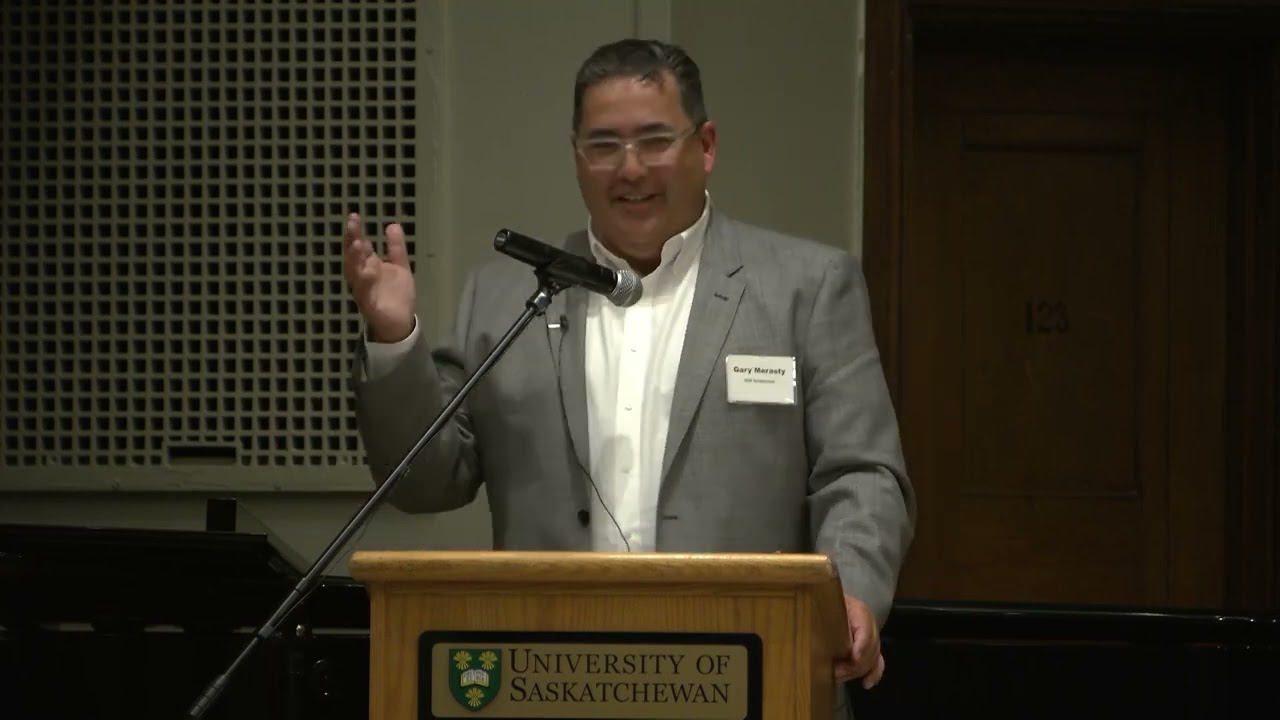National Sustainability Conference Recognizes Saskatchewan Indigenous Leadership
A national sustainability conference held a symposium at USask last June, and its recently released summary report took notable steps to recognize Saskatchewan voices on Indigenous issues.
By Matt WolsfeldIn a crowded slate of distinguished speakers, Indigenous voices from Saskatchewan held a prominent role in the recently published summaries of a national sustainability symposium last June.
Together|Ensemble 2023 was the fifth iteration of a Canadian national conference devoted to tracking progress on the 17 United Nations Sustainable Development Goals (SDGs). Hosted remotely and in-person across all of Canada by the Sustainable Development Solutions Network (SDSN), the 2023 conference theme focused on how Canada’s progress on the SDGs (currently ranked 26th in the world on SDGs implementation) can be accelerated and what needs to be done differently.
Among the more than 1,000 people who attended the presentations and panel discussions held across five event sites (including the University of Saskatchewan), an important Saskatchewan voice stood out.

Gary Merasty, Chief Executive Officer of The Peter Ballantyne Group of Companies and former Liberal Member of Parliament from northern Saskatchewan (the first Status First Nations person to be elected in the province) has been cited numerous times in the conference’s final summary report stated that “Indigenous peoples, communities and leadership must be at the forefront in all efforts to achieve the SDGs and Agenda 2030.” Merasty’s words on the intersection between the SDGs and Indigenous issues at USask’s event left a sizeable impact on the conference’s national audience and made known the difficulty northern and Indigenous communities face when it comes to progress on the SDGs.
“From an Indigenous point of view, failure to meet these goals is life and death,” said Merasty, sharing the stark reality of life in Indigenous communities. “People are dying in our communities yesterday, today and tomorrow. The failure to achieve these types of goals is literally life and death for us. [While] trying to advance common sense solutions to address a lot of the issues and challenges in our communities for decades—we’ve battled apathy, partisanship, ignorance, and systemic racism—others talked about solutions about our backyard without really involving us.”
SDSN also recognized Merasty’s perspective on issues of climate resilience, highlighting the exposure of northern Indigenous communities to the worst effects of climate change. “Hunting, fishing, and harvesting are on the verge of extinction potentially because the land is changing so drastically,” said Merasty, as he continued to explain the lack of recognition these communities receive in climate solutions. “Provincial northern communities are in political limbo. They are the first to get funding cuts and are considered later in the process to get benefits. They are treated as an afterthought as the provinces and feds debate about who is responsible for northern infrastructure.”
These comments made way for another of Merasty’s themes to be highlighted in the report: the role of recognizing and supporting youth action. “We have a demographic conflict [in Northern Canada] where the average age is under 22 [compared to ] over 45 in the rest of Canada. This means that there is conflicting public policy in looking at ageing care versus services for youth, which is often met with the response that it’s ‘too expensive to build it in the north for such a small population.’”
We caught up with Merasty following the symposium, who had some final food for thought. “I don’t want to seem like I’m being unnecessarily dramatic. Why is it life and death? We experience severe forest fires threatening communities and way of life, more severe weather impacting hunting, fishing and harvesting,” he expanded. “Extremely low water events and floods are more frequent, and the cost of energy is escalating as energy transition progresses impacting day-to-day costs of food, fuel, petroleum-based products, including heating. These events are very real. All costs are going up in a low-income region. The cost of fuel escalates as the energy transition progresses, impacting quality of life, poverty and [our ability to achieve the SDGs].
Merasty wasn’t the only Saskatchewan voice that left an impact on the conference summary. Tim Faveri, VP Sustainability at Nutrien Ltd. and participant in USask’s expanded symposium event was recognized in the report for his comments on the SDGs’ global challenge of feeding 10 billion people by 2050. “Through sustainable agriculture, environment and climate action, and inclusive agriculture, we work directly with more than 500,000 farmers or growers to help increase food production sustainably for generations to come.” The contributions to the conference by Faveri and the rest of USask’s panel on SDG 1: Zero Hunger were cited among SDSN’s “Areas of Hope” as we move forward towards a sustainable future.
The full conference summary report can be found at the conference’s website, while USask's live stream (and Gary's speech) can be seen on YouTube. For more ways that you can get involved in sustainability at USask—including taking part in the many events of SDG Week 2024—head over to sustainability.usask.ca.
